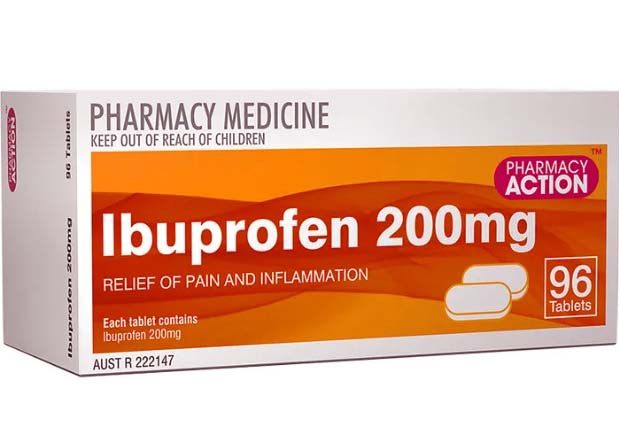Nikhil Prasad Fact checked by:Thailand Medical News Team Oct 20, 2025 1 month, 2 weeks, 3 days, 11 hours, 1 minute ago
Medical News: A Common Drug with Hidden Power
Ibuprofen, a familiar household painkiller used for headaches, cramps, and fevers, is now drawing scientific attention for an unexpected reason—it may help protect against certain types of cancer. Recent research suggests that this inexpensive over-the-counter drug could have powerful anti-cancer effects, opening new conversations about how inflammation and tumor development are connected. Scientists from the U.S. National Cancer Institute, the University of Washington, and the University of Southern California have been exploring how ibuprofen, long used for pain relief, might also reduce the risk of cancer in women and possibly other groups.

The study, which was part of the large Prostate, Lung, Colorectal, and Ovarian (PLCO) Cancer Screening Trial, followed more than 42,000 women aged 55–74 over a span of 12 years. In this
Medical News report, the research team found that women who regularly took ibuprofen—at least 30 tablets per month—had a 25 percent lower risk of developing endometrial cancer compared to those who took fewer than four tablets per month. The protective link appeared to be strongest among women with pre-existing heart disease.
How Ibuprofen Works Against Cancer
Ibuprofen belongs to a group of medications known as non-steroidal anti-inflammatory drugs (NSAIDs). These drugs reduce inflammation by blocking enzymes called cyclooxygenases (COX), which play a role in both pain and swelling. There are two main types: COX-1 and COX-2. While COX-1 helps maintain the stomach lining and blood flow to the kidneys, COX-2 is more directly involved in triggering inflammation. By inhibiting both, ibuprofen lowers the levels of inflammatory molecules called prostaglandins. Scientists believe this reduction could slow or stop the growth of abnormal cells that may turn cancerous.
Targeting Endometrial and Other Cancers
The new study focused on endometrial cancer, which begins in the lining of the uterus and primarily affects postmenopausal women. Being overweight or obese is a major risk factor because excess fat increases estrogen levels, fueling the growth of cancer cells. Other risks include hormone therapy, diabetes, polycystic ovary syndrome, and older age. Symptoms often include unusual vaginal bleeding or pelvic pain.
Interestingly, while ibuprofen appeared beneficial, aspirin did not show a similar protective effect against endometrial cancer in this research. However, earlier studies indicate that aspirin might help prevent bowel cancer recurrence. Other NSAIDs like naproxen have also been linked to lower risks of colon, bladder, and breast cancers.
A Broader Impact Across Cancer Types
Beyond endometrial cancer, ibuprofen may help reduce risks for colorectal, lung, breast, and prostate cancers. Laboratory studies show that it can interfere with genes such as HIF-1α, NFκB, and STAT3, which allow cancer cells to survive under stress and resist treatment. By reducing the activity of these genes, ibuprofen might make tumors more vulnerable to chemotherapy and radiation. Some research also shows that ibuprofen may alter how DNA is packaged, further s
ensitizing cancer cells to treatment.
Balancing Promise and Risk
Despite the excitement, researchers urge caution. Prolonged or excessive use of ibuprofen can cause stomach ulcers, gastrointestinal bleeding, and kidney or heart problems. It can also interact dangerously with blood thinners and antidepressants. Moreover, not all studies agree—some suggest that NSAIDs could, in certain contexts, increase mortality after a cancer diagnosis.
Still, the idea that an everyday drug might play a role in cancer prevention is both fascinating and hopeful. If future research confirms these findings, ibuprofen could become part of targeted cancer-prevention strategies, especially for people at higher risk. Until then, experts emphasize focusing on well-established lifestyle habits—balanced diets, regular exercise, and routine health checks—to lower cancer risks naturally.
References:
https://onlinelibrary.wiley.com/doi/10.1002/ijc.70101
https://www.emjreviews.com/oncology/news/ibuprofen-emerges-as-protective-factor-against-endometrial-cancer/
https://www.bmj.com/content/355/bmj.i6188
https://mbrc.shirazu.ac.ir/article_6973.html
https://www.sciencedirect.com/science/article/abs/pii/S1047847714002433
https://www.mdpi.com/2073-4409/10/6/1487
https://journals.plos.org/plosone/article?id=10.1371/journal.pone.0323635
https://www.nature.com/articles/s41416-020-0906-7
https://onlinelibrary.wiley.com/doi/full/10.1002/ijc.35363
https://www.cell.com/heliyon/fulltext/S2405-8440(23)10411-7?uuid=uuid%3A36697d88-ee94-4d3c-8754-db42e17bde1b
For the latest on Cancer, keep on logging to Thailand
Medical News.
Read Also:
https://www.thailandmedical.news/articles/cancer
https://www.thailandmedical.news/articles/med-news
